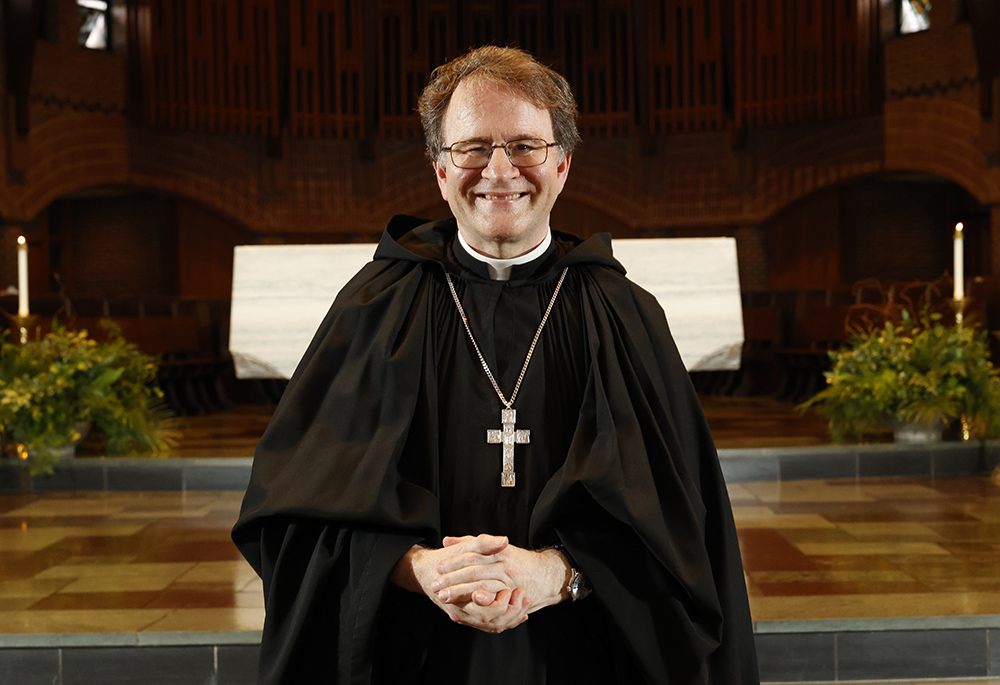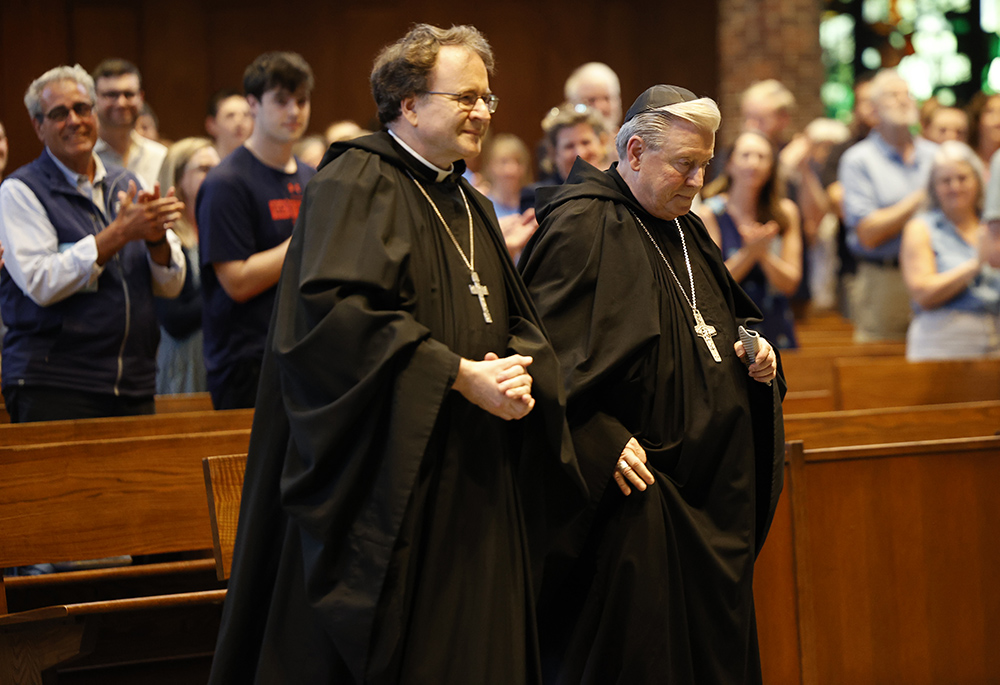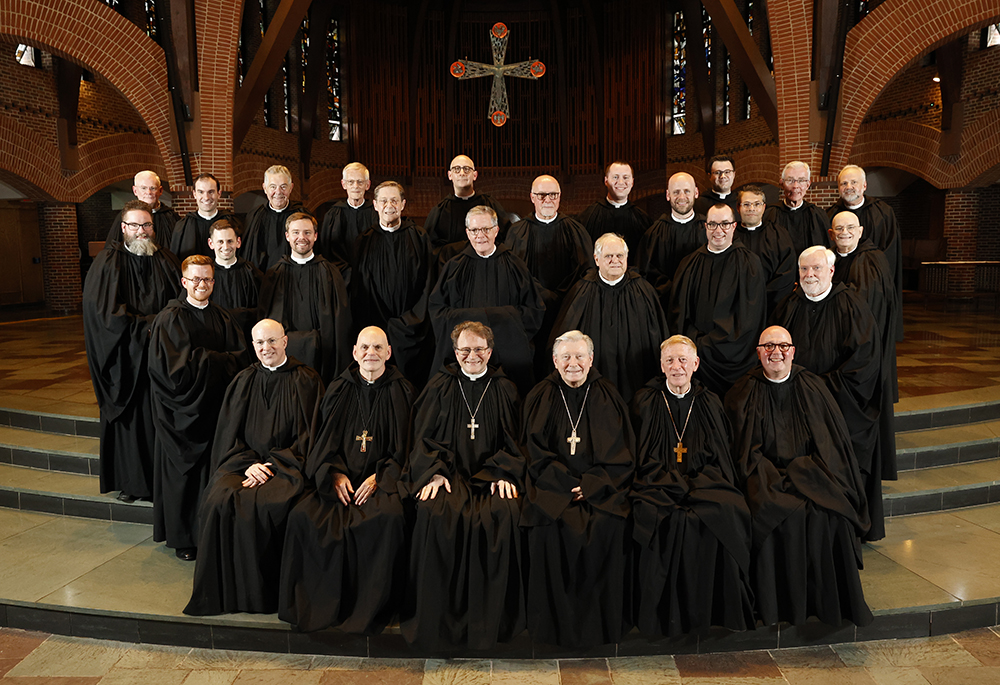
Benedictine Abbot Isaac Murphy was elected the sixth abbot of St. Anselm Abbey in Manchester, New Hampshire, on June 17. Murphy entered the community in the 1990s. (Courtesy of Leah LaRiccia)
Benedictine Abbot Isaac Murphy was elected the sixth abbot of St. Anselm Abbey in Manchester, New Hampshire, on June 17. He is the first non-ordained abbot since Pope Francis announced in 2022 that lay brothers can lead religious communities of priests and brothers with Vatican permission, and the first non-ordained abbot in the history of the United States.
"I'm happy and proud to be the abbot," said Murphy, who will also serve as chancellor of St. Anselm College and the Chair of the Members of the St. Anselm College Corporation. He served as prior, the second in command of the abbey, from 2005 to 2013.
"We got the right person that the community needs. It wasn't a hang-up that he wasn't ordained," said Benedictine Fr. Francis McCarty who served as the election secretary. "The community isn't making any kind of statement by electing a brother — we elected Brother Isaac because he'd be a good abbot," he added. The abbey has long had non-ordained brothers in positions of leadership, something that made it an attractive community initially to Murphy when he entered in the 1990s.
St. Anselm Abbey is part of the American-Cassinese Congregation, a group of Benedictine monasteries primarily located in the United States. Benedictine Abbot President Jonathan Licari presided over the election. It was intended to begin April 29 with a day of nominating candidates and prayer, and conclude on April 30 with voting. Several candidates were considered, and the community voted for Murphy.

Abbot Isaac Murphy is pictured with Abbot President Jonathan Licari. (Courtesy of Leah LaRiccia)
In a 2022 rescript, Francis granted an exception to canon law. But because being a lay brother is still a canonical impediment to being elected as the superior of a community with both lay and ordained men, Licari had to suspend the election. He needed a decision from the Dicastery for Institutes of Consecrated Life and Societies of Apostolic Life in Rome, which took six weeks. "It was anxiety producing, awaiting the answer from Rome. We didn't know how long it would take," said Murphy.
During this time, Licari appointed Prior Benedictine Fr. Augustine Kelly as temporary administrator. When the Vatican sent their affirmation, he was able to reopen the election and confirm Murphy's appointment.
"I think this is a wonderful opportunity for the American-Cassinese Congregation, and all Benedictines, because it opens up the door for more qualified people," said Licari.
Murphy thinks the abbey is on the right path, and doesn't plan any major changes now that he's in charge. "I'm very pleased by the observances we have," he said. The abbey follows the Rule of St. Benedict, developed by the early medieval monk St. Benedict, who was himself not ordained.
Advertisement
They are still figuring out how to handle liturgies like their Christmas Mass that traditionally the abbot presides over. One thought is to make a difference between "presiding" and "celebrating," akin to how Pope Francis currently is not celebrating Mass due to his inability to stand for long periods. Murphy noted that a previous abbot of St. Anselm's would ask the prior to celebrate. There are some other details to work out as well, like whether or not he can wear a mitre, which is associated with the episcopacy but that certain abbots can also wear. "It's all new," said Licari.
One thing on Murphy's mind, as it is for every superior of an American religious house, is how to get more people to want to enter. The abbey has had a good decade for vocations. While Murphy acknowledges that vocations can go in cycles, he wants to do his best to keep the growth continuing.
"There is no secret. You have to live an authentic life. You want people to know you," he said.
The type of man they hope to attract is someone who wants to embrace an apostolate of Catholic higher education, which is the primary work of the abbey. Some serve as faculty in the theology department or work in campus ministry. But others serve in roles like running the campus art museum, or as NCAA compliance coordinator.

The Benedictines of St. Anselm Abbey in Manchester, New Hampshire (Courtesy of Leah LaRiccia)
As a high number of the monks are alumni of the college, having a robust Catholic campus life is also part of their vocations strategy.
"We have to be intentional and have conversations with mission and identity front and center. It's not just curriculum requirements, but having it integrated, and a pastoral mission, so students can flourish in a Catholic environment," Murphy said.
McCarty is also the assistant director of campus ministry at St. Anselm College, and so works directly with students. "I want to show that we live an authentic monastic life that is true to our founder St. Benedict, and the monastic vocation within the church, but also showing potential vocations, and everybody, that we're human beings," he said.
"People put clergy and religious on a pedestal. I'm a human being just like you are, I love things, I hate things, I struggle with things. We're all called to holiness, and this is the way I'm called to live it out," he added. He is an alumnus of the college, and entered five years after graduation.
McCarty noted that even if a young man isn't interested in entering immediately, getting to know so many monks during a formative time in his life will keep it in his head as an option. "When you meet a monk who's close to you in age, becoming a monk seems a lot more possible," he said. The abbey gets about 2-3 men a month asking for more information, and about six men a year making a weekend discernment retreat.
The abbey also runs Woodside Priory School, a college preparatory school in California, which currently has three brothers in residence. Murphy said he knows people wish there was a higher monastic presence at the school, but will wait to decide any new plans for the school until after an upcoming visit this fall.
Murphy, originally from Montreal, Quebec, holds a bachelor's, master's and doctorate in political science, and has been a lecturer in the college's political science department. "I hope the New Hampshire primary continues to be the first," he said; the college is home to the New Hampshire Institute of Politics, which hosts presidential campaign debates.
In addition to prior and lecturer, he was also the college's vice president for academic affairs and most recently the executive vice president. He was on the college's governing board from 2002 to 2009 and has been on the board of trustees from 2009 to the present.
Murphy also has a long-standing blog, where he reviews the books the community reads at meals. "Book reviews maybe aren't what people want from an abbot's blog," he said, but he is not sure what he wants to do next with it.
St. Anselm Abbey was founded in 1889 by monks from St. Mary's Abbey in Newark, New Jersey. In addition to the college and the school, they also run a parish in Manchester, New Hampshire*. There are currently 29 monks.
*This story has updated to correct the location of St. Anselm Abbey's parish.




